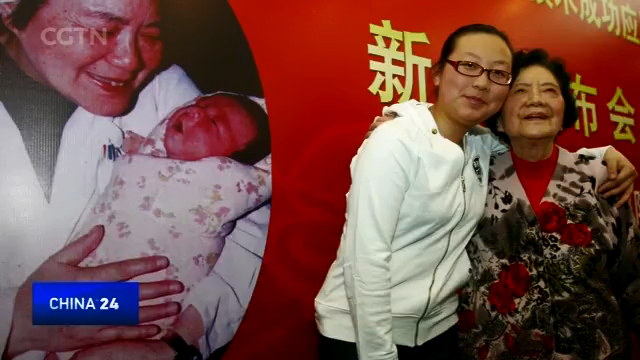
00:04, 05-Oct-2018
30 Years of IVF Babies: Test-tube technologies then and now
Updated
23:26, 07-Oct-2018
02:42

It's been 30 years since the birth of China's first in-vitro fertilization baby, and such technology is helping more and more couples conceive. Every year, more than 200-thousand babies in the Chinese mainland are born via assisted reproductive means, like IVF. CGTN's Sun Tianyuan goes to where the first test tube baby was born, shows us the strides doctors there have made, and what to expect looking ahead.
Peking University Third Hospital; the cradle of China's modern assisted reproduction technology.
The hospital continuously explores ways to help infertile couples become parents - dating back to when family planning was a national policy in China.
Practicing here since 1985, Dr. Liu Ping has witnessed China's fertility technologies advance from day one.
DR. LIU PING DEPUTY DIRECTOR, REPRODUCTIVE MEDICAL CENTER PEKING UNIVERSITY THIRD HOSPITAL "Peking University Third Hospital has always followed industry leaders closely. Over the past 30 years, we have gradually mastered assisted reproduction technology, practically from zero. Now we're on a par with the world's top hospitals."
30 years of technological leaps and bounds overlapped with China's reform and opening-up.
DR. LIU PING DEPUTY DIRECTOR, REPRODUCTIVE MEDICAL CENTER PEKING UNIVERSITY THIRD HOSPITAL "The reform and opening-up provided an opportunity, a window for China to learn cutting-edge technologies and exchange innovative ideas with other countries. It helped us overcome challenges, gain experience, cultivate talent and eventually, we established our own system and treatment methods."
In 1978, Louis Brown, the world's first tube baby, was born in England.
10 years later, Liu's mentor, Dr. Zhang Lizhu delivered the Chinese mainland's first one.
Zhang's patient was 38 years old with a 5 percent success rate - almost a miracle - for women her age.
SUN TIANYUAN BEIJING "In 1988, Zheng Mengzhu was born in this hospital. The nation cheered as she came into the world. At 30 years of age, Zheng has come back here, to work."
Zheng didn't want to speak to us herself, but Dr. Liu says she's a valued member of the hospital.
DR. LIU PING DEPUTY DIRECTOR, REPRODUCTIVE MEDICAL CENTER PEKING UNIVERSITY THIRD HOSPITAL "I think this is a familiar place for her, she's emotionally attached to it. Zheng interned here back in college, and has been working at the hospital since graduation."
Zheng is just one of many cases.
Last year, the hospital conducted 30 thousand treatments, 10 times that of a comparable center in the US.
Now with the universal second-child policy in full swing, more couples, with first child or not, will seek solutions in both science and faith. Sun Tianyuan, CGTN, Beijing.

SITEMAP
Copyright © 2018 CGTN. Beijing ICP prepared NO.16065310-3
Copyright © 2018 CGTN. Beijing ICP prepared NO.16065310-3